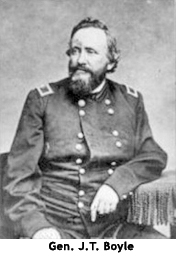|
Kentucky’s Civil War leaders…
Jeremiah T. Boyle gained recognition
as lawyer, soldier, railroad entrepreneur
(EDITOR’S NOTE: This is the 31st in a series about Kentucky’s officers and battle leaders during the Civil War.)
 Union Brig. Gen. Jeremiah T. Boyle raised a brigade of infantry at the outbreak of the Civil War and was recognized for his gallantry at the 1862 Battle of Shiloh. Union Brig. Gen. Jeremiah T. Boyle raised a brigade of infantry at the outbreak of the Civil War and was recognized for his gallantry at the 1862 Battle of Shiloh.
The lawyer, soldier and railroad entrepreneur advocated the abolition of slavery although he was a slaveholder himself. He argued for a gradual emancipation of slaves as a delegate to the State Constitutional Convention in 1849. He served as Commonwealth’s Attorney in 1861 before he began recruiting volunteers for the Union army and received his commission as brigadier general.
Boyle was born and raised in Mercer County (now Boyle County) and was graduated from the College of New Jersey in 1838. He was the son of Judge and Chief Justice John Boyle, for whom Boyle County was named. He then studied law at Transylvania University and became a successful lawyer in Harrodsburg and Danville.
The Boyle native married Elizabeth Owsley Anderson of Garrard County and raised seven children. For a number of years, he was engaged in business with his brother-in-law, William Clayton Anderson, a former United States Congressman. Boyle supported the Constitutional Union Party in the election of 1860.
In May 1862, Boyle was appointed Military Governor of Kentucky by President Abraham Lincoln, and at times served in command of both the District of Kentucky and District of Western Kentucky. Curiously, the Official Records refer to Boyle's command as the “District of Western Kentucky,” although at that time it included all of Kentucky except Western Kentucky, which was assigned to the District of Columbus. Boyle dispatched troops several times to combat incursions and cavalry raids by John Hunt Morgan.
Boyle resigned in 1864 after his son, the Union Army’s youngest colonel, Lt. Col. William O. Boyle, was killed in action at the Battle of Marion in Virginia. He had been affectionately known as “the Boy Major.” Boyle later was an unsuccessful candidate for Kentucky governor and congressman.
Following his return home, Boyle speculated in land and became interested in street railways and urged Louisville officials to establish such service. In 1865, he became the president of the Louisville City Railway Company and oversaw the creation of the first mass transportation system in the Commonwealth.
Boyle was president of the Evansville, Henderson and Nashville Railroad from 1866 until his death in 1871. He traveled to Europe and secured French investors to back a project to expand narrow-gauge rail service in Kentucky.
At age 53, Boyle died in Louisville and was buried in Bellevue Cemetery in Danville.
|

